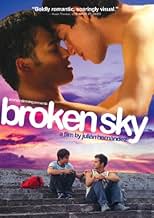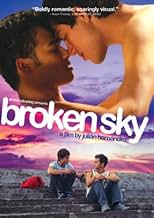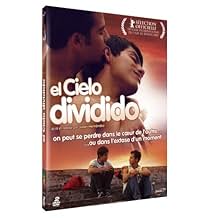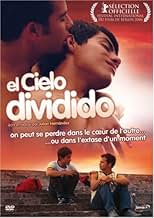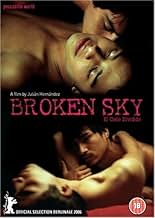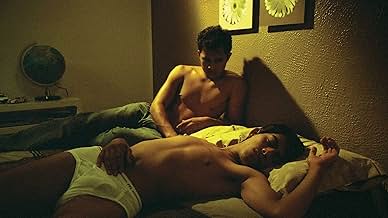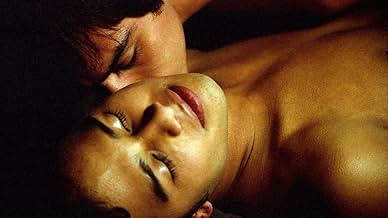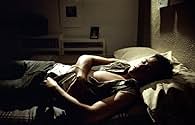CALIFICACIÓN DE IMDb
5.7/10
1.3 k
TU CALIFICACIÓN
Agrega una trama en tu idiomaTwo students, Gerardo and Jonas, are in love. However, Jonas becomes obsessed with another boy, which leads to Gerardo moving into arms of Sergio.Two students, Gerardo and Jonas, are in love. However, Jonas becomes obsessed with another boy, which leads to Gerardo moving into arms of Sergio.Two students, Gerardo and Jonas, are in love. However, Jonas becomes obsessed with another boy, which leads to Gerardo moving into arms of Sergio.
- Dirección
- Guionista
- Elenco
- Premios
- 2 premios ganados en total
Clarisa Rendón
- María
- (as Clarissa Rendón)
- Dirección
- Guionista
- Todo el elenco y el equipo
- Producción, taquilla y más en IMDbPro
Opiniones destacadas
This could have been the gay counterpart to Gone With The Wind given its epic lenght, but instead it satisfied itself by being a huge chain of empty episodes in which absolutely nothing occurs. The characters are uni-dimensional and have no other development in the story (there's actually no story either) than looking for each other and kissing. It's a shame that an interesting aesthetic proposition like having almost no dialog is completely wasted in a film than makes no effort in examining the psychology of its characters with some dignity, and achieving true emotional resonance. On top of that, it pretends to be an "art" film by using the worst naive clichés of the cinematic snobbery. But anyway, if someone can identify with its heavy banality, I guess that's fine.
The film is a bit tedious. It's mostly a silent film, with the bulk o the story provided through a series of voice-overs. While making a silent film like this is not such a bad idea, this is one of those films where the lack of dialog and the repetitive early scenes make it simply tedious. You don't understand the reason for the tedium until well into the picture, and by then it's too late. The first 40 minutes of film is something of a slow piece of Mexican soft porn, and unimaginative soft porn at that. Later in the film the style of the first 40 minutes starts to makes sense, but it's too late, because by then the audience is lost. There is some nice location shooting at the National Autonomous University of Mexico. I've often wondered why more films aren't shot there. The campus is built on the edge of lava fields that lend the campus a very otherworldly feel. My biggest problem with the film is that the director/writer has made the film the way he wanted to see it without regard for how a viewer who doesn't know the story will view it. You can't ignore the audience when you tell a story.
"Broken Sky" is an art film with great performances, visually entertaining (stills/photography shots during credits are superbly done!), and plot treatment not usually seen in any gay films. Some people may find scenes excruciatingly long, but I've enjoyed every moment of it and the journey the director wants to convey in this movie. You must know that you need this arduous shots to feel the emotions of the characters in the movie. The sex scenes are tastefully done, not vulgar, and the gratuitous frontal nudity is significant (in one scene, main actor examines his body/self on the mirror). I've always admired Latin cinema movie-making as mostly they always get the right texture and lighting for their 35 mm. movie. In totality, it's one of the best films I've seen during L.A. OUTFEST 2006 (next to movies: "A Love to Hide," "Boy Culture" and "The Blossoming of Maximo Oliveros"). -- Oliver Carnay
Like João Pedro Rodrigues (Two Drifters), Mexican filmmaker Julián Hernández makes obsessively gay films unlike Almodóvar, whose outlook may be gay but who has achieved almost universal acceptance through his varied milieus, intricately amusing plots and use of women in prominent roles (not to mention his general brilliance as a filmmaker, which neither Rodrigues nor Hernández has yet established). Hernández's sphere is even more narrow than Rodrigues', but more emotionally accessible and less odd. Influences include Cocteau, Pasolini, Wong Kar Wai and the Duras/Resnais collaboration of' Hiroshima mon amour, a line from which is quoted as an epigraph. Unlike Rodrigues', this filmmaker's few characters are not oddballs or obsessives but simply prettier-than-average middle-class Mexico City young men oppressed by love-longing. Like Hernández's previous feature A Thousand Clouds of Peace (2003) in its preoccupations but with higher production values, the subject is a young man whose love object eludes him. Two female characters are barely more than glimpsed in passing. We're examining a gay love affair and nothing else. These are students, but don't ask what their majors are. They spend more time in discos than in classrooms.
As in the previous Hernández feature, plot and dialogue are minimized. There are voiceovers but the characters rarely speak. We get used to their miming their feelings. Gerardo (Miguel Angel Hoppe) picks up Jonas (Fernando Arroyo) in a playing field at the university and the passionate kisses and embraces and the sex begin right away. Then Jonas starts averting his face when Gerardo tries to caress or kiss him. And yet they're still regularly sleeping together. Gradually a third person enters the picture Sergio (Alejandro Rojo), a slightly older man, a tall, dark, brooding fellow, even easier on the eyes than the other two. He has already watched the pair play hide and seek in the library stacks when he was installing a light bulb. Sergio has wanted Gerardo for a long time, or so he says when they finally get together after one of several encounters in a gay-friendly club in this film, everywhere is gay friendly. Scenes take place either around the university, in the guy's rooms, or in a club; all problems other than love are minimized or eliminated. Except for some yellow filters, the photography is pretty, but straightforward. None of Wong Kar Wai's richly grungy pads here: the rooms are conventional middle-class housing, with tasteful prints on the walls and textbooks on the shelves, not palatial but posh for students' digs. The guys only have a few pairs of jeans, but they sure have lots of shirts.
The message that the film conveys and though it is too long, it's basic idea works; the scenes convey the desired feelings and the editing is seamless at first is that two people never seem to love each other at the same time to the same degree in the same way.
But the ending is a happy and romantic one. Once Sergio and Gerardo are a couple, Jonas begins to long for Gerardo again, and in the final scene, they've gotten back together.
Broken Sky is more like a poem or an opera or most of all, a dance than a conventional film. It's a different experience. The mainstream audience would never put up with all this gay sex without dialogue or plot. Not every gay man will have the patience to watch these amorous comings and goings for the full 140 minutes, either. I'm not sure that the poetic voiceovers were necessary; and a third of them are lost to non Spanish-speakers because the white-on-white subtitles are illegible. They are a bit too poetic and general. The boys are too specific to be so generalized by the language. Needless to say, "the real world" is beyond the range of Broken Sky. But there's no denying that Broken Sky in its own way is unique and beautiful. The director achieves what he was clumsily groping for in his first one. He is using cinematic language in a way that it rarely is any more he achieves the instinctive identification and emotional directness of the silent film. Broken Sky makes you think about the unspoken element in any relationship, the things that can never be communicated in words: in short, the world of eroticism and feelings. Hernández contributes to the effectiveness of his visual poem through excellent use of various musical accompaniments, a few notes on a clavicord, a string quartet above all, a sweet pop love song the lyrics of each lovingly translated in subtitles. It's as if Gerardo and Jonas were trying to live a pop song. And I guess that's what moony young gay guys do a lot of the time. There's even a coloratura operatic aria; considering the operatic tone of things, the filmmakers exercise great forbearance in using only one. Maybe this is "a new cinematic language," as was said of Antonioni's L'Avventura. For a while one can savor it, admire the naive sweetness of it. But can anyone read it? And can it say more than one thing?
As in the previous Hernández feature, plot and dialogue are minimized. There are voiceovers but the characters rarely speak. We get used to their miming their feelings. Gerardo (Miguel Angel Hoppe) picks up Jonas (Fernando Arroyo) in a playing field at the university and the passionate kisses and embraces and the sex begin right away. Then Jonas starts averting his face when Gerardo tries to caress or kiss him. And yet they're still regularly sleeping together. Gradually a third person enters the picture Sergio (Alejandro Rojo), a slightly older man, a tall, dark, brooding fellow, even easier on the eyes than the other two. He has already watched the pair play hide and seek in the library stacks when he was installing a light bulb. Sergio has wanted Gerardo for a long time, or so he says when they finally get together after one of several encounters in a gay-friendly club in this film, everywhere is gay friendly. Scenes take place either around the university, in the guy's rooms, or in a club; all problems other than love are minimized or eliminated. Except for some yellow filters, the photography is pretty, but straightforward. None of Wong Kar Wai's richly grungy pads here: the rooms are conventional middle-class housing, with tasteful prints on the walls and textbooks on the shelves, not palatial but posh for students' digs. The guys only have a few pairs of jeans, but they sure have lots of shirts.
The message that the film conveys and though it is too long, it's basic idea works; the scenes convey the desired feelings and the editing is seamless at first is that two people never seem to love each other at the same time to the same degree in the same way.
But the ending is a happy and romantic one. Once Sergio and Gerardo are a couple, Jonas begins to long for Gerardo again, and in the final scene, they've gotten back together.
Broken Sky is more like a poem or an opera or most of all, a dance than a conventional film. It's a different experience. The mainstream audience would never put up with all this gay sex without dialogue or plot. Not every gay man will have the patience to watch these amorous comings and goings for the full 140 minutes, either. I'm not sure that the poetic voiceovers were necessary; and a third of them are lost to non Spanish-speakers because the white-on-white subtitles are illegible. They are a bit too poetic and general. The boys are too specific to be so generalized by the language. Needless to say, "the real world" is beyond the range of Broken Sky. But there's no denying that Broken Sky in its own way is unique and beautiful. The director achieves what he was clumsily groping for in his first one. He is using cinematic language in a way that it rarely is any more he achieves the instinctive identification and emotional directness of the silent film. Broken Sky makes you think about the unspoken element in any relationship, the things that can never be communicated in words: in short, the world of eroticism and feelings. Hernández contributes to the effectiveness of his visual poem through excellent use of various musical accompaniments, a few notes on a clavicord, a string quartet above all, a sweet pop love song the lyrics of each lovingly translated in subtitles. It's as if Gerardo and Jonas were trying to live a pop song. And I guess that's what moony young gay guys do a lot of the time. There's even a coloratura operatic aria; considering the operatic tone of things, the filmmakers exercise great forbearance in using only one. Maybe this is "a new cinematic language," as was said of Antonioni's L'Avventura. For a while one can savor it, admire the naive sweetness of it. But can anyone read it? And can it say more than one thing?
Brilliant concept, brilliant direction, brilliant cast.
Take the final scene. Was that a happy ending or a moment from the past? What to make of the mutual love declaration in the penultimate scene?
What I love about this film are the lateral images - stairs, venetian blinds, bridges, ladders, bookcases, freeways, bars, beds, photographs - and all the shoulder touching, love making, full of doubt and sheer longing moments that overlay them.
This, coupled with the camera's constant circling around the protagonists make this a truly remarkable film. (I hope you noticed the scenes where the same actor appears in more than one spot in the same take.)
Yes, this film is not for everyone. Yes, there is little dialog, and yes, most of you will pan it.
For me, el Cielo Dividido remains a silent, magical love story, brilliantly told by Julián Hernández, coupled with exceptional photography and outstanding performances from Fernando Arroyo, Miguel Ángel Hoppe and Alejandro Rojo in the lead roles.
I listened to to the closing lyrics, " so close, so far," and looked back to the beautiful story I'd just been told.
Well done.
Take the final scene. Was that a happy ending or a moment from the past? What to make of the mutual love declaration in the penultimate scene?
What I love about this film are the lateral images - stairs, venetian blinds, bridges, ladders, bookcases, freeways, bars, beds, photographs - and all the shoulder touching, love making, full of doubt and sheer longing moments that overlay them.
This, coupled with the camera's constant circling around the protagonists make this a truly remarkable film. (I hope you noticed the scenes where the same actor appears in more than one spot in the same take.)
Yes, this film is not for everyone. Yes, there is little dialog, and yes, most of you will pan it.
For me, el Cielo Dividido remains a silent, magical love story, brilliantly told by Julián Hernández, coupled with exceptional photography and outstanding performances from Fernando Arroyo, Miguel Ángel Hoppe and Alejandro Rojo in the lead roles.
I listened to to the closing lyrics, " so close, so far," and looked back to the beautiful story I'd just been told.
Well done.
¿Sabías que…?
- ConexionesReferenced in Padre de familia: Road to Rupert (2007)
- Bandas sonorasEn mi cielo
Written and performed by Volovan
By Arrangement with Universal Music Mexico
Selecciones populares
Inicia sesión para calificar y agrega a la lista de videos para obtener recomendaciones personalizadas
Detalles
- Fecha de lanzamiento
- País de origen
- Sitios oficiales
- Idioma
- También se conoce como
- Broken Sky
- Locaciones de filmación
- Productoras
- Ver más créditos de la compañía en IMDbPro
Taquilla
- Total en EE. UU. y Canadá
- USD 29,185
- Fin de semana de estreno en EE. UU. y Canadá
- USD 4,956
- 1 oct 2006
- Total a nivel mundial
- USD 160,445
- Tiempo de ejecución2 horas 20 minutos
- Color
- Mezcla de sonido
- Relación de aspecto
- 1.85 : 1
Contribuir a esta página
Sugiere una edición o agrega el contenido que falta

